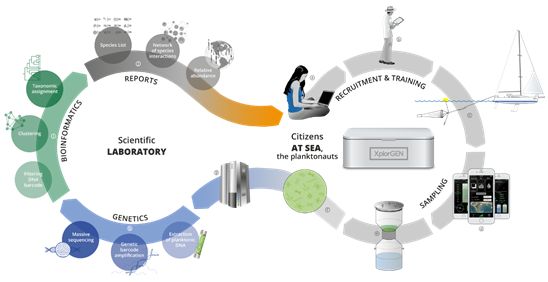New fully funded PhD project available in 2017 – see overview of projects and general details here.
Project Specifics:
In every litre of seawater there are between 10 and 100 billion life forms — plankton — forming the largest planetary Life network that generates half of our oxygen and regulate climates. Yet plankton sampling from research vessels is still very expensive, and oceanographic models aimed at predicting global plankton ecological changes critically lack high-resolution biological data. There is an urgent need for innovative approaches enabling collection and analysis of plankton biodiversity over much larger spatio-temporal scales than is currently possible. In 2015 we launched ‘Plankton Planet’ (www.planktonplanet.org), an international program that uses DNA barcoding to assess the biodiversity of plankton samples collected by sailing cruisers (the planktonauts!) worldwide. A major challenge is to design a low-cost, effective plankton collection device (e.g., modified ocean net) that can be easily deployed from any sailing yachts at various water velocity, to collect pristine plankton communities in the open ocean without stopping the boat.

This engineering project will involve detailed background research, before designing an experimental set up that will allow studying the flow and forces for various net designs, as well as their potential for preserving plankton integrity for further genetic/imaging protocols. Advanced measurement techniques will be used, such as Particle Image Velocimetry (PIV). Ultimately, a field prototype will be manufactured, and employed in the open sea.
For this project, besides having an engineering-related background, having a strong interest in marine biology, and preferably a passion for sailing would be beneficial. Candidates with 3D prototype modelling and PIV experience are especially encouraged to apply.
The project will be supervised by Dr Heide Friedrich, Prof Andrew Jeffs (Institute of Marine Science) and Dr Xavier Pochon (Cawthron Institute). Active collaboration is planned with plankton experts in France (Colomban de Vargas and Gaby Gorsky’s teams), who have coordinated the TaraOceans expeditions (http://science.sciencemag.org/content/348/6237/873) and are directing Plankton Planet. The student will be expected to interact with other members of the wider team and contribute to programme workshops.
Download a pdf here.
For more information, please email h.friedrich@auckland.ac.nz.